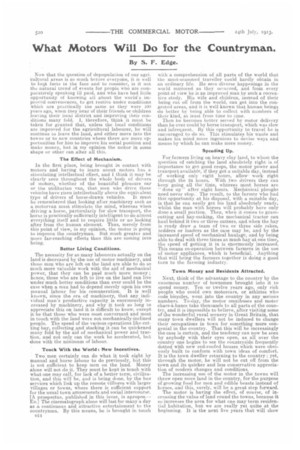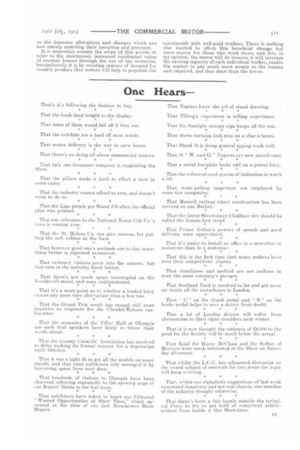What Motors Will Do for the Countryman.
Page 4

Page 5

If you've noticed an error in this article please click here to report it so we can fix it.
By S. F. Edge.
Now that the question of depopulation of our agricultural areas is so much beiore everyone, it is well to look facts in the face and to consider, is it not the natural trend of events for people who are comparatively speaking ill paid, and who have had little opportunity of knowing all about the world's unproved conveniences, to get restive under conditions which are practically the same as they were IOU years ago, when they hear of their friends or children leaving their local district and improving their conditions many fold. 1, therefore, think it must be taken for granted that., sinless the local conditions are improved for tho agricultural labourer, he. will continue to leave the land, and either move into the towns or to now countries where there are more opportunities for him to improve his social position and make money, but in my opinion the motor in. some shape or other can alter all this.
The Effect of Mechanism.
in the first place, being brought in contact with motors and having to learn about motors has a stimulating intellectual effect, and 1 think it may be clearly seen throughout the whole body of drivers of motors, whether of the beautiful pleasure ear or the utilitarian van, that men who drive these vehicles have risen intellectually above the equivalent
type of drivers of horse-drawn vehicles. It must be remembered that looking after machinery such as motorvan must stimulate the mind, whereas when driving a horse, particularly for slow transport, the horse is practically sufficiently intelligent to do almost everything itself and to require little or no looking after from tho human element. Thus, merely from this point of view, in my opinion, the motor is going to improve the countryman. But much greater and more far-reaching effects than this are coming into being.
Better Living Conditions.
The necessity for so many labourers actually OIL the land is decreased by the use of motor machinery, and those men who are left on the land are able to do so touch more valuable work with the aid of mechanical power, that they can be paid much more money ; hence, those who are left to live on the land can live under much better conditions than ever could be the case when a man had to depend merely upon his own manual labour for his remuneration. It is well known, since the era of machinery, that any individual man's productive capacity is enormously increased by machinery, and why it took so long to appreciate this on land it is difficult to know, except it be that those who were most conversant and most in touch with the land were not mechanically-inclined people. The speed of the various operations like cutting hay, collecting and stacking it can be quickened many fold by the aid of mechanical power and traction, and not only can the work be accelerated, but done with the minimum of labour.
Touch With the World: New Incentives.
Two men certainly can do what it took eight by manual and herse labour to do previousl3r, but this is not sufficient to keep men on the land. Money alone will not do it. They must be kept in touch with what one may call, for lack of a laetter term, civilization, and this will be, and is being done, by the bus services which link up the remote villages with larger villages or towns, where there is sufficient support for the usual town amusements and social intercourse. [A prospectus, published in this issue, is apropos.— En.] The einematograph alone will last for many a day as a continuous and attractive entertainment to the countryman. By this means, he is brought in touch
nit
with a comprehension of all parts of the world that the most-seasoned traveller could hardly obtain in an ordinary life. He sees diverse happenings in the world mirrored as they ()centred, and from every point of view he is an improved man try such a recreative study. His wife and children, instead of their being cut off from the world, can get into the congested areas, and it is well known that human beings do better by being able to collect with numbers of their kind, at least from time to time.
Then he becomes better served by motor delivery than he ever could by horse transport, which was slow and infrequent. By this opportunity to travel he is encouraged to do so. This stimulates his wants and makes his mind more ingenious to devise ways and means by which he can make more money.
Speeding Up.
For farmers living on heavy clay land, to whom the question of catching the land absolutely right is of importance to get good crops' the motor power and transport available, if they get a suitable day, instead of working only eight hours, allow-work right through the, 2,4 hours. With two drivers they can keep going all the tinie, whereas most horses are " done up " after eight hours. Mechanical .plonghs need never stop.. The result, to the farmer who had this opportunity at his disposal, with a suitable day, is that he can easily get his land absolutely ready, whilst the man with horses will probably have only done a small portion. Then, when it conies to grasscutting and hay-making, the mechanical tractor can. haul behind it two or three cutters, and when the hay is ready draw a team of two or three side rakes, tedders or loaders as the case may be, and by the increased speed of mechanical haulage, and by being able to deal with three times as ninth hay.at one time, the speed of getting it in is enormously increased, This means co-operation between farmers in the use of motor appliances, which is beneficial. Anything that will bring the farmers together is doing a good turn to the farming industry: Town Money Ilnd Residents Attracted.
Next, think of the advantage to the country by the enormous number of townsmen brought into it to spend money. Ten or twelve years ago, only rich people who could own motorcars, or athletes who rode bicycles, went into the country in any serious numbers. To-day,the motor omnibuses and motor chars-habanc.s take thousands to all parts of the courttry, and it is impossible to believe, after visiting some of the wonderful rural scenery in Great Britain, that many town dwellers will not be inducedto change their occupations in town for something more congenial in the country. That this will be increasingly the case is certain, and the tendency can now he seen by anybody with their eyes open, as all over the country one begins to see the countryside frequently dotted with new red-roofed houses which were obviously built to conform with town ideas of comfort. It is the. town dweller returning to the country ; yet, through the motor, he will not be cut off from the town and its quicker and less conservative appreciation of modern changes and conditions.
The increasing use of the motor in the towns will throw open more land in the country, for the purpose of growing food for men and edible beasts instead of horses, and this, surely, will be a. great step forward. The motor is having the effect, of course, of increasing the value of land round the towns, because it so increases the area for what one may term residential habitation, but we are really yet quite at the beginning. It is the next five years that will show us the itnmense alterations and changes winch are now merely asserting their inception and presence. It is somewhat outside the scope of this article to refer to the enormously increased residential value of country houses through the use of the motorcar, but4indireetly it is by creating centres of demand for country produce that motors will help to populate the countryside with well-paid workers. There is nothing else wanted to effect this beneficial change but more money for those who work there, and this. in increase the opinion, the motor will do because it will the earning capacity of each individual worker, enable the master to pay much more money to the human unit required, and thus draw from the towns.








































































